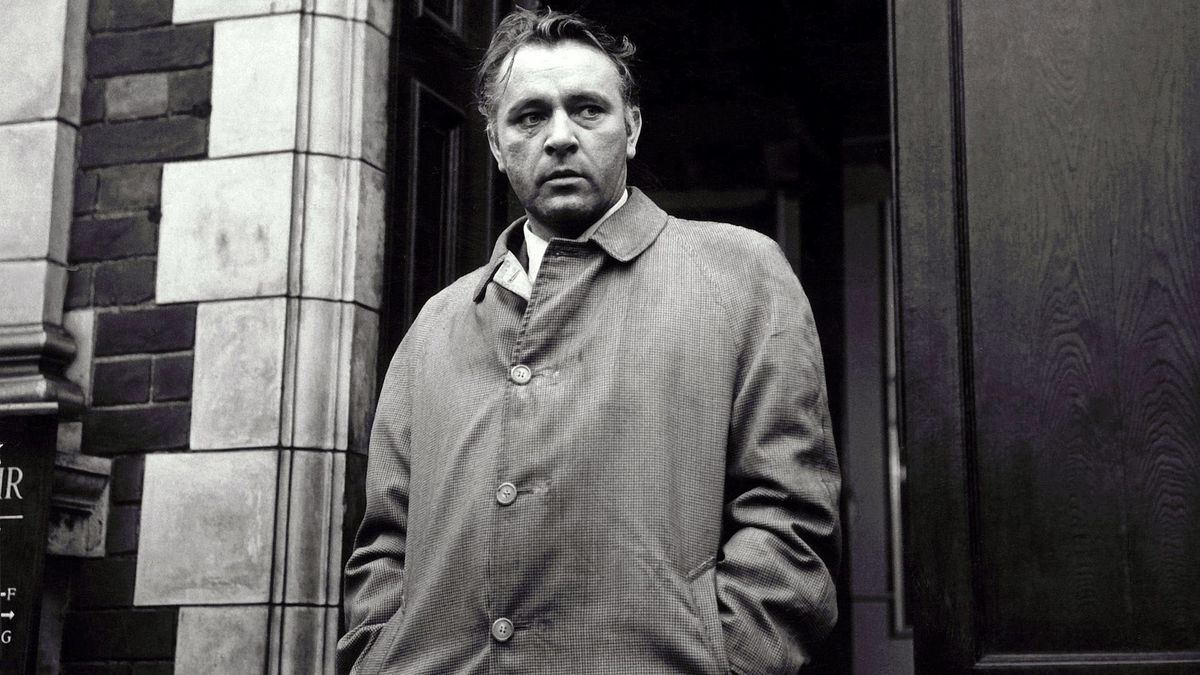In 1965, the spy genre in films was split into two halves. On the one hand was the romantic world of the gentleman spy: James Bond or some of Hitchcock’s protagonists. On the other hand, there’s the relatively bleak and straightforward world of working-class spies like Harry Palmer. Martin Ritt’s (Hud, Norma Rae) adaptation of Le Carre’s ‘The Spy Who Came In From The Cold’ arrived as a jolt to the public’s perception of what espionage really was like. The spy was not a knight incarnate but an ordinary bureaucrat, his demeanor entirely dulled by a lifetime of protracted and prosaic undertakings. Nearly six decades on, it’s important to remember the extent to which this film would go on to influence the genre’s elusive search for realism – a novel by a former secret service worker is about as close to authenticity as possible.
With no extensive armory of gadgets or evil brain-washing devices and, more importantly, a muddled moral stance, Ritt’s world was devoid of any sense of adventure or excitement. It was the kind of film that retrospectively brought out the pure romanticism of Hitchcock’s delving into the genre. James Bond (already a divisive figure) would no longer figure in any serious conversation about spy films. Richard Burton’s grimy turn as Alec Leamas, a world-weary spy, was one of his finest performances that stood in stark contrast to the then clean-cut poster boys of the genre: Cary Grant, Sean Connery, and Michael Caine. Why Ritt’s film remains a foundational work of the genre is that, for the first time, it presented an espionage story as not a work of rousing triumph, but an alarming tragedy of the contemporary world and its politics.
Plot
During some time in the early 1960s, Alec Leamas, an MI6 (British Secret Service) agent, waits at the Allied sector of Berlin for the arrival of his informant, Karl Riemeck, from the Soviet sector. Riemeck, on the run from Hans Dieter Mundt, an East German Intelligence officer, is shot before he can cross over to the Allied sector, and the mission is consequently deemed a failure. Back in London, MI6 chief, Control, seems initially disappointed in Alec but soon uncovers an elaborate plan. Here begins the long con.
Alec is ostensibly dismissed from MI6. He takes up a low-paid job in a local library while drowning his miseries in alcohol. At his workplace, he meets Nancy Perry, a card-carrying member of the British Communist Party. They develop a friendship which soon turns into love. Alec’s alcoholism makes him insolvent, and soon, he lands up in jail after a drunken scuffle with a convenience store owner.
Following his release, he is approached by a shady figure named Ashe. This entire sequence of events was pre-planned by Control for Alec to be seen as a potential defector by the East Germans with valuable information, given that he had worked as a field agent in Germany for nine years. From Control and George Smiley, Alec learns that their plan involves Alec pretending to be a defector.
Mundt’s second-in-command, Fiedler, suspects the former of secretly being a British agent. Alec is to pose as a defector and provide the necessary information to Fiedler that will conclusively incriminate Mundt and have him assassinated. Control’s plan had always included a mission that Alec had previously undertaken, dubbed Operation Rolling Stone, which involved visits to Helsinki and Copenhagen.
Alec meets up with Dick Carlton, an associate of Ashe’s and an East German spy. He cryptically proposes they fly to Hague, where he will be briefed about his course of action in defecting, for which he will be paid £15,000. Here begins Alec’s downward journey into the hellscape of Cold War espionage, a world so infernal that even his 18 embittering years in the Secret Service doesn’t prepare him for it.
What was Operation Rolling Stone?
Alec, working in the Banking Section, had the job of sanctioning payments for agents whose names he never knew. Operation Rolling Stone was a clandestine mission, christened by Control, where Alec was to secretly open two separate joint bank accounts with false names – one in Copenhagen and the other in Helsinki – and then deposit large sums of money in them. These amounts were withdrawn a week later by the co-holder of these accounts with him, a man by the name of Werner Ziebold. Alec, who used the false name, Woolrych, to open these accounts, had no idea about Ziebold and never cared to find out.

As we later learn, Ziebold was actually Mundt who withdrew the money from these accounts when he visited the two cities following Alec’s opening of the accounts. Alec never knew that Mundt was part of the chain of command he himself was a part of, and Mundt’s alias, Ziebold, achieved this.
Why was the newspaper story about Alec run in England?
Alex was initially told that he’d be interrogated about what he knew of Mundt’s activities in Hague for two weeks, and his absence from London would remain discreet. Yet Fiedler ran a piece in the London newspaper about him being missing so that his public disappearance would make him come across as a possible traitor. This would mean he couldn’t escape to England if he wished to or seek help from his former employers if the need for it arose. Fiedler did this purely as a security measure, being completely unaware of the ruse that Alec was playing.
What was Riemeck’s role exactly?
Riemeck, the man shot down in the film’s opening scene, was a high-ranking member of the Presidium of the East German Communist Party. His defection to Alec began with a microfilm he gave to him that contained images of the minutes from a meeting of the Presidium. This was the kind of sensitive and valuable information that Riemeck passed on to Alec. The latter’s indifferent attitude never made him look into how Riemeck managed to secure such intelligence in the first place.
Fiedler’s hypothesis during the tribunal, which was eventually proven to be accurate, is that between Mundt’s arrest and release in England in 1959, he had turned into a double agent. From 1960, he started recommending Riemeck to positions of exceptional responsibility in the Presidium, eventually landing him the role of Secretary. This is how Riemeck constantly had access to top-secret information, which he would pass on to Alec and, by extension, MI6.
How do the East Germans eventually uncover the plot?
Two minor mistakes give away Alec’s fake testimony as a defector. Following the meeting with Ashe, Alec took a taxi to Chelsea, where he met with Control and George Smiley, a planner in the section called Satellite Four’. This taxi was obviously tailed. So, this visit was the first mistake despite Alec’s vehement claim of being too drunk to remember where he went after the meeting with Ashe. He was, at the time, playing the role of a dismissed MI6 agent and hence, had no need to pay a visit to a working British spy. At the meeting where the whole plan of defection was set in motion, Alec had asked Control to keep Nancy out of danger and be provided with financial help during his absence.
The second error was Smiley contacting Nancy as Alec’s friend and giving her the lease to her house as a gift. Alec couldn’t have paid for it as he was broke, so MI6 paid for it. Moreover, the bank where the lease was bought was Blatt & Rodney, the bank through which Alec made the anonymous payments to MI6 agents, as he told Peters.

Ending
Alec and Nancy are released from prison by Mundt, as he was a double agent working for MI6. During his arrest, he was turned into one, as Fiedler had hypothesized, in 1959. The entire stratagem was organized not to get rid of Mundt but Fiedler. As it turns out, Fiedler started to get suspicious of his superior Mundt being a traitor and, given their mutual hatred for each other (Mundt was a member of the Hitler Youth and Fiedler was a Jew), started looking into his activities. Control planned this elaborate ploy as a means of reinstating the East German Intelligence Unit’s faith in Mundt as being a loyal worker of theirs and so continued to work as a double agent.
Fiedler couldn’t just be killed, as that would leave too many avenues open for suspicions against Mundt to resurface. Therefore, Fiedler’s skepticism had to be publically disgraced, and in turn, Mundt publically rehabilitated. Alec never knew he was not the one conning but was being conned all along. Both he and Mundt were meant to discredit each other as a way of getting rid of Fiedler. Once the job was done, Mundt allowed Alec and Nancy to escape. The two of them escaping would ignite suspicions about a larger conspiracy, for which Mundt can scapegoat Fiedler’s friends, further incriminating him and improving his reputation as a defender of his nation.
Why is Nancy shot?
Just when they’re about to escape following the young soldier’s aid, Nancy is shot dead before she can cross over to West Berlin. This is done because Nancy is a regular civilian who was exposed to extremely sensitive State secrets, making her a great risk to East German security. The only way to ensure her silence was to kill her, and this was staged as a measure carried out against her while she was illegally trying to cross the Berlin Wall.
When Smiley doesn’t even bat an eye at Nancy’s death and asks Alec to cross over quickly, Alec realizes that Nancy’s dispensability was sanctioned by the British. Realizing the kind of expendable pawns people like him and Nancy are, Alec decides not to return to his side, feeling severely betrayed. As he returns to the Eastern side, he too, like Nancy, is shot down for scaling the Wall.
Morality and Espionage
The Cold War’s division of the world into two ideological power blocs is seen by Alec as being run by two governing forces – God and Karl Marx. The West, represented by MI6, sees itself as benevolent by not being the aggressor. The East, though underrepresented, survives against the spread of Western ideology by employing methods that the God-fearing West regards as immoral. Alec stands at the center of the two. He is neither an atheist nor a man with faith. He is a survivor, trying to get by in a system that treats the likes of him in a purely expedient fashion. This is exactly why he can see past the visions of grandeur with which the likes of Control and Fiedler, driven by static ideologies, delude themselves.
As he asserts in his anecdote to Nancy, his lack of an ideology makes him understand that ordinary people are the most pitiable victims of the Cold War. This comes back in a more impassioned fashion at the end when he scoffs at Nancy’s derision for the Western mode of operating. Alec despises both sides equally, hating the system that played him like a fiddle throughout the film and the enemy, which has its own violent history (the end of Stalinism was still fresh). As he puts it to Fiedler, this hatred for both and disregard for conventional morality makes him survive.
He’s a man whose position is in the ‘No Man’s Land’ between East and West Germany. Ritt poetically brings about his demise as a choice of a side on Alec’s part by not staying where he was the safest, on the Wall, and hence, devoid of a moral compass. By getting down on the Eastern side, it isn’t that he’s choosing the Soviet side but rather choosing to leave the Western side (and, by extension, the filthy world of espionage) behind.






